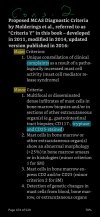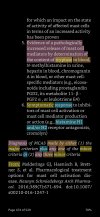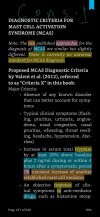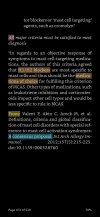Apologies for any confusion! I simply wanted to avoid giving the impression that I was speaking for you in posting the criteria details.My view is you only need to Conenssu 2 to diagnose. But if I were a Consensus 1 believer, I would confess I don't understand your question. I doubt it has much if anything to do with your question's quality, but rather my ignorance. Perhaps if you dumb it down some?
- Home
- Forums
- Discussion topics
- Other specific illnesses discussions
- Immune: Autoimmune and Mast Cell Disorders
You are using an out of date browser. It may not display this or other websites correctly.
You should upgrade or use an alternative browser.
You should upgrade or use an alternative browser.
Mast Cell Activation Syndrome (MCAS) - discussion thread
- Thread starter Dakota15
- Start date
Regarding Consensus-2, the origin of the term appears to be in this paper by Afrin et al:
Edited to correct some confusion on my part.
Just to be clear, as the AI-response did not include the details, is this the MCAS criteria you have been talking about, @hallmarkOvME ?
Diagnosis of mast cell activation syndrome: a global “consensus-2"
Which, as part of its supplemental material, includes critiques of existing MCAS criteria. Which designates the criteria developed by Molderings et al. and refined in a 2017 paper as Consensus-2:Risk of solid cancer in patients with mast cell activation syndrome: Results from Germany and USA
This latter paper includes two sets of criteria as part of its supplementary data. The first is what Afrin et al designate as Consensus-2:
Table S2 Criteria defining Mast Cell Activation Syndrome (MCAS)
1. Constellation of clinical complaints attributable to pathologically increased MC activity (MC mediator release syndrome)
Minor criteria
1. Multifocal or disseminated infiltrates of MCs in marrow and/or extracutaneous organ(s) (e.g., gastrointestinal or genitourinary tract; >19 MCs/high power field)
2. Abnormal spindle-shaped morphology in >25% of MCs in marrow or other extracutaneous organ(s)
3. Abnormal MC expression of CD2 and/or CD25 (i.e., co-expression of CD117/CD25 or CD117/CD2)
4. MC genetic changes (e.g., activating KIT codon 419, 509 or 560 mutations) shown to increase MC activity
5. Evidence (typically from body fluids such as whole blood, serum, plasma, or urine) of above-normal levels of MC mediators including:
6. Symptomatic response to inhibitors of MC activation or MC mediator production or action
Criteria proposed to define mast cell (MC) activation syndrome when all other diagnoses that could better explain the full range and chronicity of the findings in the case have been excluded (modified from [16]). The diagnosis mast cell activation syndrome is made upon fulfilment of the major criterion plus at least one minor criterion.
Edited to correct some confusion on my part.
Just to be clear, as the AI-response did not include the details, is this the MCAS criteria you have been talking about, @hallmarkOvME ?
Last edited:
hallmarkOvME
Senior Member (Voting Rights)
I'm pissed at the AI and at myself for trusting. I put up screen shots from the Walker book asap and AI posts. Sorry for wasting you and the mod's time.Regarding Consensus-2, the origin of the term appears to be in this paper by Afrin et al:
Diagnosis of mast cell activation syndrome: a global “consensus-2"
Which, as part of its supplemental material, includes critiques of existing MCAS criteria. Which designates the criteria developed by Molderings et al. and refined in a 2017 paper as Consensus-2:
Risk of solid cancer in patients with mast cell activation syndrome: Results from Germany and USA
This latter paper includes two sets of criteria as part of its supplementary data. The first is what Afrin et al designate as Consensus-2:
Edited to correct some confusion on my part.
Just to be clear, as the AI-response did not include the details, is this the MCAS criteria you have been talking about, @hallmarkOvME ?
Last edited:
hallmarkOvME
Senior Member (Voting Rights)
Jonathan Edwards
Senior Member (Voting Rights)
I am completely confused by all this . Are we supposed to look at criteria X or Y? Is one of them consensus 2?
Jonathan Edwards
Senior Member (Voting Rights)
In general I don't think these criteria make sense as ways to identify a particular pathological entity. Like the ICC ME/CFS criteria they include preconceptions and interpretations that will bias clinicians. They also appear to be a scattershot set of abnormalities that are quite likely each to relate to quite different pathologies.
Sets of criteria like this with 'major' and 'minor' criteria hark back to the Duckett Jones criteria for rheumatic fever maybe seventy year ago. Real medicine has largely moved on from this sort of pick and mix approach to focus on individual measurable abnormalities.
The core problem is that , as for ICC, clinicians and lab workers in private clinics can apply these criteria so loosely that anybody can be diagnosed. And that seems to be exactly what happens.
I have worked with histology of mast cells in both human and rodent tissues. They are all over the place in normal tissue, especially gut, where they are the most common cause of staining artefacts.
Sets of criteria like this with 'major' and 'minor' criteria hark back to the Duckett Jones criteria for rheumatic fever maybe seventy year ago. Real medicine has largely moved on from this sort of pick and mix approach to focus on individual measurable abnormalities.
The core problem is that , as for ICC, clinicians and lab workers in private clinics can apply these criteria so loosely that anybody can be diagnosed. And that seems to be exactly what happens.
I have worked with histology of mast cells in both human and rodent tissues. They are all over the place in normal tissue, especially gut, where they are the most common cause of staining artefacts.
Thank you for digging these up and sharing them - I know it's a pain. As I have just discovered myself, the multiple revisions for both sets of criteria across a series of publications (each buried in supplemental material) don't make it easy.
The work is appreciated.
hallmarkOvME
Senior Member (Voting Rights)
Great! Thank you. I'd love to see what you think of the data. But like you said, it's hard and takes time, especially when you're sick like most of us are.Thank you for digging these up and sharing them - I know it's a pain. As I have just discovered myself, the multiple revisions for both sets of criteria across a series of publications (each buried in supplemental material) don't make it easy.
The work is appreciated.




